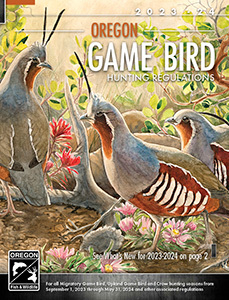Protect Your Dog In The Outdoors
Protect Your Dog From Traps
It’s rare but it happens, usually during winter when trapping activity is at its peak — a dog gets caught in a trap set for a bobcat or another furbearer. Dogs can be released safely from these traps, but some dogs are injured or die.
To reduce this risk, rules require that traps not be set within 50 feet of trails or 300 feet of campgrounds. But, dogs allowed to roam freely in the outdoors can still be at risk from traps. Here are some steps to take to reduce the risk:
- Remain in close contact with your bird dog.
- Carry a pair of wirecutters to release the dog from a snare.
It is unlawful to disturb or remove the traps or snares of any licensed trapper while that person is legally trapping on public lands or on private lands with landowner permission. If you believe a trap or snare has been illegally set, contact Oregon State Police.
Like hunting, trapping is an important wildlife management tool.
Don’t Let Your Dog Chase Wildlife
It’s dangerous for your dog, and against the law, because it harms wildlife — especially during the winter, when dogs can put more pressure on vulnerable animals trying to conserve energy.
State law prohibits people from allowing their pets to “harass” (chase, molest, worry, disturb) wildlife, except when hunting or during pursuit seasons. (Pursuit season is Sept. 1 - Jan. 31 for wild hatched upland birds. There is no pursuit season for sage-grouse, sharp-tailed grouse, or spruce grouse.) See wildlife area regulations for information on training dogs at wildlife areas.
Raw Fish and Stagnant Water — Dangerous for Dogs
Don’t let your dog eat raw salmon. It can carry the bacteria that causes deadly salmon poisoning disease (SPD) in dogs. Dogs can become severely ill when they eat fish with bacteria.
Signs of SPD in a dog are a high fever within 5-7 days of eating fish, lack of appetite, depression, dehydration, vomiting, and watery/bloody diarrhea. Seek immediate veterinary care if you think your dog has SPD — most dogs die if left untreated. (Care usually requires specific antibiotics to kill the bacteria, a wormer and intravenous rehydration.)
Freeze fish at -4 degrees F (-20 degrees C) for 24 hours or thoroughly cook it to kill the bacteria that cause SPD.
Stagnant water is another threat to dogs as it can harbor the bacteria leptospirosis. Signs of this infection in dogs are fever, reluctance to move due to joint or muscle pain, decreased appetite, weakness, vomiting and diarrhea, discharge from nose and eyes, frequent urination and jaundice.
Antibiotics can treat this infection if it is caught in time. Also talk to your vet about a vaccine that is available for some strains of leptospirosis.
Caution: Wolves and Hunting Dogs
Encounters between wolves and hunting dogs are rare. But wolves are by nature territorial and may act aggressively toward dogs. Hunters who use dogs can take steps to reduce the risk of conflict between dogs and wolves:
- Keep your dogs within view. Place a bell or beeping collar on wider ranging dogs.
- Talk loudly to the dog or other hunters
- Use whistles or otherwise control your dog so that it stays close to you. (You want wolves to associate the dog with a human.)
- If wolves are present or fresh wolf sign is observed, keep dogs close, which may require using a leash.
For more information on wolves in Oregon, please visit ODFW’s website at odfw.com/wolves.
Keep Your Dog Up To Date on Vaccinations
Wildlife can carry diseases that affect dogs — like canine distemper virus, parvovirus, adenovirus, and rabies. These pose a threat to unvaccinated pets. Visit your vet and get your dog up to date on vaccinations before outdoors season.

